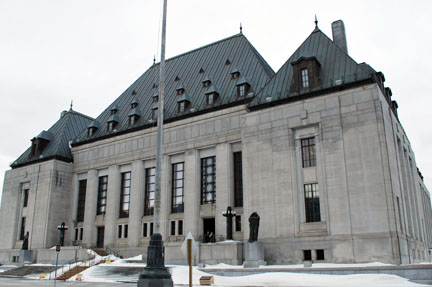The Supreme Court of Canada struck down all current restrictions on prostitution on Friday, including bans on brothels and on street solicitation, declaring the laws unconstitutional because they violated prostitutes’ safety.

The sweeping 9-0 decision in
Canada (Attorney General) v. Bedford will take effect in one year, inviting Parliament to try to come up with some other way to regulate the sex trade if it chooses to do so.
Prostitution is technically legal in Canada but most related activities have been illegal, including living off the avails of someone else’s prostitution, but the court found that the provisions were overly broad or grossly disproportionate.
Chief Justice Beverley McLachlin said many prostitutes “have no meaningful choice” but to “engage in the risky economic activity of prostitution,” and that the law should not make such lawful activity more dangerous.
“It makes no difference that the conduct of pimps and johns is the immediate source of the harms suffered by prostitutes,” she wrote.
“The impugned laws deprive people engaged in a risky, but legal, activity of the means to protect themselves against those risks.”
Shortly after the ruling was released Minister of Justice and Attorney General of Canada Peter MacKay issued the following statement:
"I am concerned that, with its ruling in the case of
Attorney General of Canada v. Bedford, the Supreme Court of Canada has found [ss.] 210, 212(1)(j) and 213(1)(c) of the
Criminal Code related to prostitution unconstitutional. The court has ordered, however, that these provisions remain in force for 12 months to give Parliament time to consider how to address this very complex matter. We are reviewing the decision and are exploring all possible options to ensure the criminal law continues to address the significant harms that flow from prostitution to communities, those engaged in prostitution, and vulnerable persons. We are committed to the safety of all Canadians and the well-being of our communities. A number of other
Criminal Code provisions remain in place to protect those engaged in prostitution and other vulnerable persons, and to address the negative effects prostitution has on communities.”
B.C’s Pivot Legal Society, which intervened in the case, said, “This decision marks a huge step forward for sex workers’ rights and human rights in Canada."
One current prostitute and two former ones, dominatrix Terri-Lynn Bedford, had initiated the challenge to Canada’s laws, arguing that sex workers would be safer if they were allowed to screen johns and operate in brothels with bodyguards if they chose.
McLachlin dismissed the federal government’s argument that it was prostitution itself, not the laws that govern it, that puts prostitutes at risk.
The safety of prostitutes became a high-profile issue in Canada following the trial and 2007 conviction of serial killer Robert Pickton, who preyed on prostitutes and other women in Vancouver’s Downtown Eastside neighborhood.
“A law that prevents street prostitutes from resorting to safe havens . . . while a suspected serial killer prowls the streets, is a law that has lost sight of its purpose,” McLachlin wrote.
Prostitution is legal in much of Europe and Latin America, and brothels are legal in numerous countries including the Netherlands, Germany and Switzerland. But questions have begun to be raised, partly because of human trafficking. France’s lower house of parliament passed a law this month imposing stiff fines on clients.
“How prostitution is regulated is a matter of great public concern, and few countries leave it entirely unregulated,” McLachlin wrote in explaining why she suspended the effect of the judgment for a year.
She said her decision “does not mean that Parliament is precluded from imposing limits on where and how prostitution may be conducted,” noting that various provisions were intertwined.
“Greater latitude in one measure — for example, permitting prostitutes to obtain the assistance of security personnel — might impact on the constitutionality of another measure — for example, forbidding the nuisances associated with keeping a bawdy house (brothel).”

 The sweeping 9-0 decision in Canada (Attorney General) v. Bedford will take effect in one year, inviting Parliament to try to come up with some other way to regulate the sex trade if it chooses to do so.
The sweeping 9-0 decision in Canada (Attorney General) v. Bedford will take effect in one year, inviting Parliament to try to come up with some other way to regulate the sex trade if it chooses to do so.